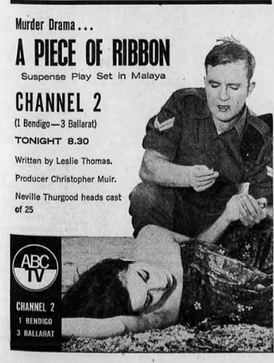Related Research Articles

Ronald Grant Taylor was an English-Australian actor best known as the abrasive General Henderson in the Gerry Anderson science fiction series UFO and for his lead role in Forty Thousand Horsemen (1940).

Anthony David Morphett was an Australian screenwriter, who created or co-created many Australian television series, including Dynasty, Certain Women, Sky Trackers, Blue Heelers, Water Rats, Above the Law and Rain Shadow. Morphett wrote eight novels, and wrote or co-wrote seven feature films, ten telemovies, twelve mini-series, and hundreds of episodes of television drama, as well as devising or co-devising seven TV series. He won 14 industry awards for TV screenwriting.

The Sentimental Bloke is a 1961 Australian musical by Albert Arlen, Nancy Brown and Lloyd Thomson based on Songs of a Sentimental Bloke by C.J. Dennis. Set in Melbourne, it is one of the most successful Australian musicals of the 20th century.

Dynasty is an Australian TV series that aired from 7 October 1970 to 6 October 1971, based on the 1967 Tony Morphett novel of the same name which had been previously adapted as a television play.
Australian Playhouse was an Australian anthology TV series featuring the work of Australian writers.

A Piece of Ribbon is a 1963 Australian television play filmed. It was based on an English TV play by Leslie Thomas that had already been performed by the BBC.
"The Brass Guitar" is the seventh television play episode of the second season of the Australian anthology television series Australian Playhouse. "The Brass Guitar" was written by Oriel Gray and originally aired on ABC on 31 July 1967 in Melbourne and on 4 September 1967 in Sydney,
"V.I.P.P." is the 26th television play episode of the first season of the Australian anthology television series Australian Playhouse. "V.I.P.P." was written by Pat Flower and directed by Brian Faull and originally aired on ABC on 10 October 1966.
"Marleen" is the 14th television play episode of the first season of the Australian anthology television series Australian Playhouse. "Marleen" was written by Pat Flower and originally aired on ABC on July 18, 1966.
"What About Next Year" is the eighth television play episode of the first season of the Australian anthology television series Australian Playhouse. "What About Next Year" was written by Richard Lane and directed by Patrick Barton and originally aired on ABC on 6 June 1966 in Melbourne and Sydney
James Workman was a Scottish-born actor and writer who mostly worked in Australia.
"Done Away With It" is the 16th television play episode of the first season of the Australian anthology television series Australian Playhouse. "Done Away With It" was written by Pat Flower and directed by Henri Safran and originally aired on ABC on 1 August 1966.
"A Small Wonder" is the 29th television play episode of the first season of the Australian anthology television series Australian Playhouse. "A Small Wonder" was written by Jeff Underhill and directed by James Davern and originally aired on ABC on 31 October 1966 in Sydney and Melbourne. and 7 November 1966 in Brisbane.
"The Lace Counter" is the 24th television play episode of the first season of the Australian anthology television series Australian Playhouse. "The Lace Counter" was written by Pat Flower and originally aired on ABC on 26 September 1966.

"Antarctic Four" is the ninth television play episode of the first season of the Australian anthology television series Australian Playhouse.
"Across the Bridge" is the 27th television play episode of the first season of the Australian anthology television series Australian Playhouse. "Across the Bridge" was written by Liane Keen and directed by Pat Alexander and originally aired on ABC on 17 October 1966.
"Watch It" is the 19th television play episode of the first season of the Australian anthology television series Australian Playhouse. "Watch It" was written by Richard Barry and directed by Storry Walton and originally aired on ABC on 22 August 1966.
"Shadow on the Wall" is the 15th television play episode of the second season of the Australian anthology television series Wednesday Theatre. It was recorded in 1967 as part of Australian Playhouse but was not aired until 10 April 1968 in Melbourne and Sydney as part of Wednesday Theatre. It was a rare contemporary Australian TV drama to address the Vietnam War.
The Harp in the South is a 1964 British television film. It was based on a novel of the same name by Ruth Park. It was directed by an Australian, Alan Burke, with many Australians in the cast including Ed Devereaux.
Brian Faull is an Australian television writer and director, best known for his long association with the ABC.
References
- ↑ "TELEVISION Nothing dull on a Wacky Ship". The Canberra Times . Vol. 41, no. 11, 505. Australian Capital Territory, Australia. 11 October 1966. p. 11. Retrieved 1 March 2019– via National Library of Australia.
- ↑ "Conscription". The Age . 29 September 1966. p. 33.
- ↑ "Varied views on Conscription today". The Canberra Times . Vol. 43, no. 12, 177. Australian Capital Territory, Australia. 7 December 1968. p. 13. Retrieved 11 June 2016– via National Library of Australia.
- ↑ Vagg, Stephen (18 February 2019). "60 Australian TV Plays of the 1950s & '60s". Filmink .
- 1 2 John Haynes; J.F. Archibald. "Vol. 88 No. 4518 (8 Oct 1966)". The Bulletin . Retrieved 23 March 2019.
- ↑ "When a play gets up and walks". The Sydney Morning Herald . 2 October 1966. p. 86.
- ↑ John Haynes; J.F. Archibald. "Vol. 88 No. 4519 (15 Oct 1966)". The Bulletin . Retrieved 23 March 2019.
- ↑ "Teletopics". The Age . 6 October 1966. p. 13.
- ↑ Monitor (8 October 1966). "For parents and teachers". The Age . p. 25.
- ↑ Televiewer (29 December 1966). "Staying true to one's viewing". The Age . p. 9.
- ↑ Vagg, Stephen (29 August 2023). "Forgotten Australian Television Plays: Boy with Banner, Objector and Watch It". Filmink.